-
RESEARCH01-01-2018
The adolescent and the institutionalization: understanding the phenomenon and meanings attributed to it
Revista Brasileira de Enfermagem. 2018;71:1373-1380
Abstract
RESEARCHThe adolescent and the institutionalization: understanding the phenomenon and meanings attributed to it
Revista Brasileira de Enfermagem. 2018;71:1373-1380
DOI 10.1590/0034-7167-2017-0242
Views1See moreABSTRACT
Objective:
To understand the meaning of being institutionalized and in conflict with the law for the institutionalized adolescent.
Method:
A qualitative, phenomenological-comprehensive study carried out in a Socio-educational Service Foundation in the northern region of Brazil, with 05 institutionalized adolescents. The analysis was carried out under the understanding of the content suggested by Heidgger, thus allowing the construction of analytical categories for a hermeneutical interpretation.
Results:
Conflicting with the law means something negative and bad for the institutionalized adolescents, in which they understand that although there is deprivation of liberty, the period of hospitalization is an important moment for the reflection on the need to start over.
Conclusion:
The meaning of conflicting with the law goes far beyond a simple word, act or behaviour, it is something that only those who experience the phenomenon are able to unveil, arouse deep feelings and provide reflection to the adolescent about the damages caused by the infraction.
-
RESEARCH01-01-2018
Assessment of the essential attributes of Primary Health Care for children
Revista Brasileira de Enfermagem. 2018;71:1366-1372
Abstract
RESEARCHAssessment of the essential attributes of Primary Health Care for children
Revista Brasileira de Enfermagem. 2018;71:1366-1372
DOI 10.1590/0034-7167-2017-0569
Views0See moreABSTRACT
Objective:
To identify the presence and extent of essential attributes in primary health care services for children, focusing on the evaluation of structure and process.
Method:
Evaluative, quantitative study carried out in 23 traditional basic health units in a city in Parana State, with 548 caregivers of children under 12 years old, using the Primary Care Assessment Instrument (PCATool Brazil), child version. Essential and general scores of the primary care were calculated according to the methodology proposed, with a cut-off score ≥6.6.
Results:
The scores of the essential attributes in relation to structure are: Accessibility (5.5), Kinship (6.9), Integrality of care – Services Available (6.0) and Coordination – System information (7.4). As for the Process, the following results were obtained: First visit – Use (8.6), Longitudinally (6.1), Integrality – Services Provided (6.1) and Coordination – Integration of Care (6.9).
Conclusion:
The essential score was 6.6 and the general score was 6.3, showing weak focus on primary health care.
-
RESEARCH01-01-2018
Sleep and salivary cortisol in preterm neonates: a clinical, randomized, controlled, crossover study
Revista Brasileira de Enfermagem. 2018;71:1358-1365
Abstract
RESEARCHSleep and salivary cortisol in preterm neonates: a clinical, randomized, controlled, crossover study
Revista Brasileira de Enfermagem. 2018;71:1358-1365
DOI 10.1590/0034-7167-2017-0546
Views0See moreABSTRACT
Objective:
Analyze the influence of ear protectors on the baseline levels of salivary cortisol and response and total sleep time of preterm neonates during two periods of environmental management of a neonatal intermediate care unit.
Method:
A clinical, randomized, controlled and crossover study conducted with 12 preterm neonates. The use of ear protectors was randomized in two periods. Sleep evaluation was performed using one Alice 5 Polysomnography System and unstructured observation.
Results:
No significant difference was observed between the baseline levels of salivary cortisol and response in preterm neonates from the control and experimental groups, and no statistical significance was observed between the total sleep time of both groups. No relationship was observed between the baseline levels of cortisol and response and total sleep time.
Conclusion:
Ear protectors in preterm neonates did not influence the salivary cortisol level and total sleep time in the studied periods.
-
RESEARCH01-01-2018
Reflections of nurses in search of a theoretical framework for maternity care
Revista Brasileira de Enfermagem. 2018;71:1351-1357
Abstract
RESEARCHReflections of nurses in search of a theoretical framework for maternity care
Revista Brasileira de Enfermagem. 2018;71:1351-1357
DOI 10.1590/0034-7167-2016-0525
Views0See moreABSTRACT
Objective:
To define a theoretical framework to guide the systematization of nursing care in a maternity unit in the South of Brazil.
Method:
This was the preliminary stage of a qualitative methodological study, based on an educational activity and the assumptions of Paulo Freire, involving 15 nurses, between August and November 2015. The aim of data analysis was to identify emerging themes.
Results:
The following themes emerged: knowledge of nurses about nursing theories; barriers to implementing and systematizing nursing care; the importance of a framework to guide practice and; educational activities as opportunities to systematize nursing care.
Conclusion:
The discussion process involved in establishing the theoretical framework enabled reflections about nursing practices, reinforcing the importance of theoretical frameworks to guide work processes and enhance quality of care.
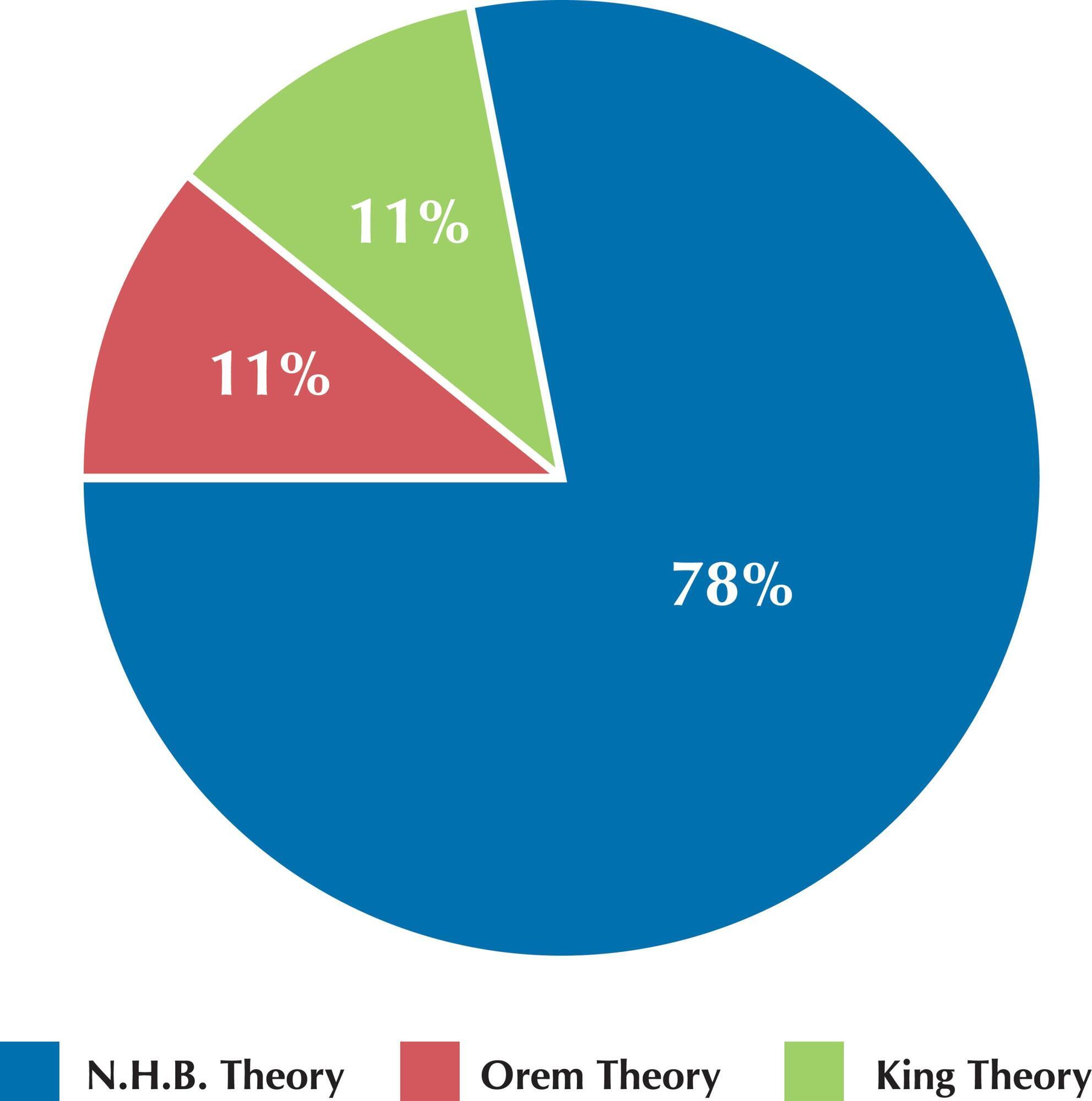
-
RESEARCH01-01-2018
Pain in the immediate puerperium: nursing care contribution
Revista Brasileira de Enfermagem. 2018;71:1343-1350
Abstract
RESEARCHPain in the immediate puerperium: nursing care contribution
Revista Brasileira de Enfermagem. 2018;71:1343-1350
DOI 10.1590/0034-7167-2017-0345
Views0See moreABSTRACT
Objective:
to analyze the contribution of clinical nursing care to the mother who has recently given birth with immediate postpartum pain based on the Kolcaba’s Theory of Comfort.
Method:
qualitative study by the research-care method. Three nurses, who provided care for women in the immediate puerperium as caregiver-researchers and 30 postpartum women, were admitted to a public maternity hospital. A semi-structured interview was used for data collection, from which the thematic analysis of the content was carried out.
Results:
nursing care with influences from the biomedical model was observed, but it expresses concern when being cared for. It offers administration of medications, guidelines and non-pharmacological measures for pain relief.
Final considerations:
nursing care based on the Theory of Comfort contributed to pain relief in the immediate puerperium.
-
RESEARCH01-01-2018
Instructional therapeutic toy in the culture care of the child with diabetes type 1
Revista Brasileira de Enfermagem. 2018;71:1334-1342
Abstract
RESEARCHInstructional therapeutic toy in the culture care of the child with diabetes type 1
Revista Brasileira de Enfermagem. 2018;71:1334-1342
DOI 10.1590/0034-7167-2017-0260
Views0See moreABSTRACT
Objective:
To analyze the experience of the child with diabetes type 1 in the care related to the techniques of glycemic monitoring and insulin application by use of instructional therapeutic toy, in accordance with the culture care.
Method:
Qualitative study with premise of the ethnonursing carried out in secondary public service of reference in the treatment of diabetes, in the city Fortaleza, Ceará State, between January and November of 2014, among 26 school-age children. Based on the Observation, Participation, Reflection Enabler, were developed educational activities using instructional therapeutic toy.
Results:
The children expressed doubts regarding the insulin therapy and the glycaemia checking. They also were interested in the orientations mediated by means of the therapeutic toy in the culture care. They asked about the rotation, location and administration of the insulin. Some children asked for the syringes to play and learn how to inject it in the dolls.
Conclusion:
To bring in this activity promoted approximation and effective communication with the child in the educational approach, increasing its ability in the self care.
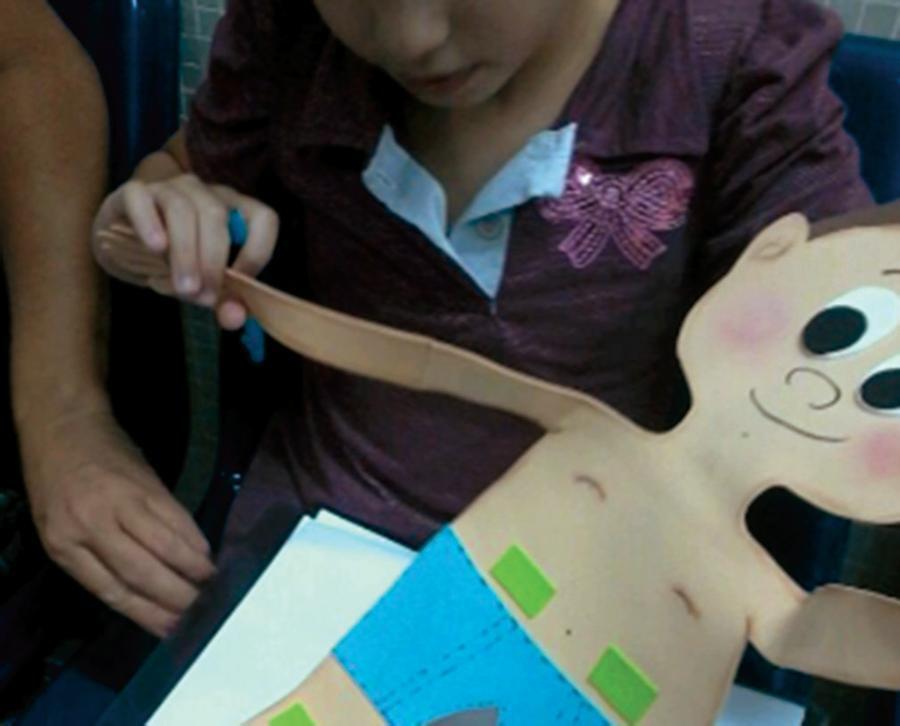
-
RESEARCH01-01-2018
Permanent Education in a neonatal unit from Culture Circles
Revista Brasileira de Enfermagem. 2018;71:1328-1333
Abstract
RESEARCHPermanent Education in a neonatal unit from Culture Circles
Revista Brasileira de Enfermagem. 2018;71:1328-1333
DOI 10.1590/0034-7167-2016-0587
Views0See moreABSTRACT
Objective:
to identify the factors that hinder and facilitate the work of the nursing team in a neonatal unit and to know the demands of Permanent Education described by the nursing team, emerging from the daily care.
Method:
qualitative study that followed the steps recommended by the “Paulo Freire’s Method” carried out with 29 professionals of the nursing team of a neonatal unit of a university hospital. Three Culture Circles were carried out to identify the generating themes.
Results:
The themes generated were organized according to the issues covered in the interviews and during the Culture Circles, with four themes being highlighted: lack of routines; training; improvement of coexistence of the team and improvement of management process.
Final considerations:
The study made it possible to know the factors that hinder and facilitate the routine practice of nursing professionals by identifying the emergent themes of the Culture Circles that favored the critical reflection of the group, generating subsidies for the collective elaboration of the Permanent Education program in neonatal unit.
-
RESEARCH01-01-2018
Existential experience of children with cancer under palliative care
Revista Brasileira de Enfermagem. 2018;71:1320-1327
Abstract
RESEARCHExistential experience of children with cancer under palliative care
Revista Brasileira de Enfermagem. 2018;71:1320-1327
DOI 10.1590/0034-7167-2016-0493
Views0See moreABSTRACT
Objective:
To understand the existential experience of children with cancer under Palliative Care from the Humanistic Nursing Theory’s point of view.
Method:
This is a field and qualitative research, in which eleven children participated, supported by the Support Centre for Children with Cancer in Paraíba State. To collect data it was used the Story Drawing Procedure. The data were qualitatively analyzed based on Humanistic Nursing Theory.
Results:
From the analysis of the empirical study’s subject, the following thematic categories have emerged: children experiencing fear, sadness, anguish and insecurity in the face of their diagnosis and children experiencing fear of their family falling apart because of the possibility of dying.
Conclusion:
It is fundamental the participation of nurses in the Palliative Care to the children with cancer in order to strengthen the trust between the children and the professional to have the relationship of dialogue as central axis.
-
ORIGINAL ARTICLE11-28-2023
Geospatialization of tuberculosis and income transfer programs among Indigenous peoples in an endemic territory
Revista Brasileira de Enfermagem. 2023;76:e20220216
Abstract
ORIGINAL ARTICLEGeospatialization of tuberculosis and income transfer programs among Indigenous peoples in an endemic territory
Revista Brasileira de Enfermagem. 2023;76:e20220216
DOI 10.1590/0034-7167-2022-0216
Views1See moreABSTRACT
Objective:
To analyze the spatial pattern of tuberculosis in Indigenous peoples from the State of Pará and its correlation with income transfer.
Methods:
Ecological study, with 340 cases reported in Indigenous peoples in the State of Pará, Brazil, in the period 2016-2020. The study performed a descriptive analysis and calculation of incidence rates with smoothing by the local empirical Bayesian method. The Global Moran index assessed the autocorrelation of the rates with income transfer data, p<0,05.
Results:
The Marajó and metropolitan mesoregions of Belém had the highest tuberculosis rates, and a reduced number of people benefited from income transfer (high-low correlation). The study identified high rates, and a significant number of people benefited from financial aid (high correlation high), I=0.399, p=0.027 in the Southwest.
Conclusions:
The spatial autocorrelation between tuberculosis and access to income transfer programs constitutes a relevant subsidy for the formulation of social protection policies and may impact the disease control actions in Indigenous territories, valuing the epidemiological heterogeneity identified in the mesoregions.
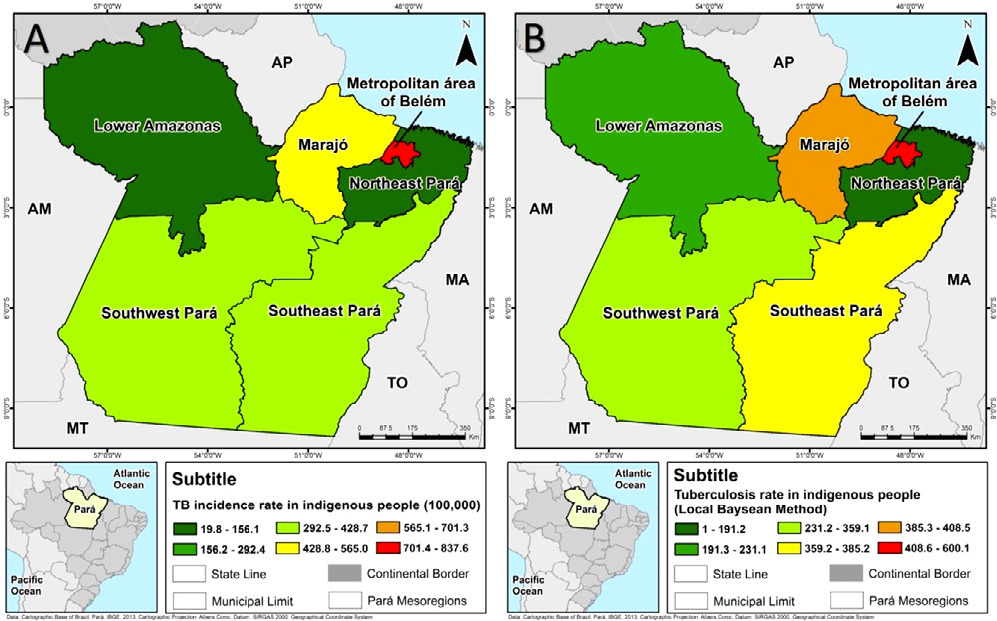
-
ORIGINAL ARTICLE11-13-2023
Vulnerability to physical inactivity: evidence of content validity and response processes
Revista Brasileira de Enfermagem. 2023;76:e20220563
Abstract
ORIGINAL ARTICLEVulnerability to physical inactivity: evidence of content validity and response processes
Revista Brasileira de Enfermagem. 2023;76:e20220563
DOI 10.1590/0034-7167-2022-0563
Views0See moreABSTRACT
Objective:
To analyze content validity evidence and response processes of a bank of items for measuring vulnerability to physical inactivity in adults.
Method:
Methodological study, with 13 specialists and 46 representatives of the target population. The Content Validity Index (CVI) and binomial test were calculated; data obtained through validity based on response processes were collected through interviews.
Results:
Of the 105 constructed items, 16 were excluded (CVI<0.78); 89 items showed agreement <80% in the psychometric criteria, being modified. Of the 101 items that remained (CVI>0.78), 34 were changed and 4 were deleted after evaluating the evidence of response processes. In the end, 97 items remained, with a global CVI of 0.92, organized into two dimensions: Subject (CVI=0.91) and Social (CVI=0.94).
Conclusion:
The items presented adequate parameters and evidence of validity; and can subsidize the construction of instruments that consider the subject’s and social vulnerability in understanding physical inactivity.
-
ORIGINAL ARTICLE12-08-2023
The relationship between level of knowledge and vaginal discharge prevention behavior for nursing student
Revista Brasileira de Enfermagem. 2023;76:e20220602
Abstract
ORIGINAL ARTICLEThe relationship between level of knowledge and vaginal discharge prevention behavior for nursing student
Revista Brasileira de Enfermagem. 2023;76:e20220602
DOI 10.1590/0034-7167-2022-0602
Views0See moreABSTRACT
Objective:
Reproductive health in adolescent girls is very important. To determine the relationship between the level of knowledge and the behavior of preventing vaginal discharge among nursing students.
Methods:
a quantitative, cross-sectional study, with 155 first-year female students at a private faculty of nursing. Data were collected from February to March 2022, using an electronic questionnaire.
Results:
98.1% of participants have a good level of knowledge and 92.3% of participants practice good vaginal discharge prevention behavior.
Conclusion:
good knowledge produces appropriate prevention behavior. The result of this study can be used as a contribution of thoughts and references as a more in-depth study of the factors that influence the level of knowledge and behavior about the disease of the genitalia and the dangers of pathological vaginal discharge.
-
ORIGINAL ARTICLE11-13-2023
Access of people with pulmonary tuberculosis to government programs: Primary Care professionals’ perceptions
Revista Brasileira de Enfermagem. 2023;76:e20220716
Abstract
ORIGINAL ARTICLEAccess of people with pulmonary tuberculosis to government programs: Primary Care professionals’ perceptions
Revista Brasileira de Enfermagem. 2023;76:e20220716
DOI 10.1590/0034-7167-2022-0716
Views0See moreABSTRACT
Objective:
to analyze Primary Health Care professionals’ perceptions about the access of people with pulmonary tuberculosis to government social support and income transfer programs.
Methods:
multicenter/qualitative study, carried out in Family Health Units in four Brazilian capitals: Belém/Pará, Campo Grande/Mato Grosso do Sul, Recife/Pernambuco and Rio de Janeiro/Rio de Janeiro. Fifty-eight professionals participated (social workers, dentists, nurses, pharmacists, physicians and nursing technicians), who provided assistance to people with pulmonary tuberculosis. Individual interviews were conducted, and the content analysis technique was used.
Results:
among the participants, 45/77.6% were women and 33/56.9% were between 25 and 40 years old. Two thematic categories were organized, demonstrating the perceptions about the possibilities of access to government programs by people with pulmonary tuberculosis in vulnerable situations and the obstacles inherent to this context.
Final considerations:
it is necessary to move forward in improving patient access to social programs.
-
ORIGINAL ARTICLE12-08-2023
Fear of COVID-19 when experiencing pregnancy or childbirth in the pandemic: what are the associated factors?
Revista Brasileira de Enfermagem. 2023;76:e20220755
Abstract
ORIGINAL ARTICLEFear of COVID-19 when experiencing pregnancy or childbirth in the pandemic: what are the associated factors?
Revista Brasileira de Enfermagem. 2023;76:e20220755
DOI 10.1590/0034-7167-2022-0755
Views0See moreABSTRACT
Objective:
to identify factors associated with fear of COVID-19 among women who experienced pregnancy or childbirth during the pandemic.
Methods:
a cross-sectional study, nested within a prospective cohort, using an online survey, from August 2021 to February 2022, based on descriptive data analysis.
Results:
of the 431 participants, 52.8% were postpartum women and 20.1% were pregnant women. With regard to fear of COVID-19, a mean score of 20.46 was obtained (moderate fear). The highest fear scores were present in women whose newborns were admitted to hospital in neonatal critical units (p=0.032), and the lowest among those covered by supplementary health (insurance) (p=0.016).
Conclusion:
among pregnant and postpartum women, high fear of COVID-19 translated into the possibility of having newborns admitted to hospital in a critical unit. The importance of supporting actions to support pregnant/postpartum women’s mental health in relation to COVID-19 or other threats that may influence the neonatal outcome stands out.
-
ORIGINAL ARTICLE11-21-2023
Coping strategies for chronically ill children and adolescents facing the COVID-19 pandemic
Revista Brasileira de Enfermagem. 2023;76:e20230045
Abstract
ORIGINAL ARTICLECoping strategies for chronically ill children and adolescents facing the COVID-19 pandemic
Revista Brasileira de Enfermagem. 2023;76:e20230045
DOI 10.1590/0034-7167-2023-0045
Views0See moreABSTRACT
Objective:
to understand the experiences and coping strategies of children and adolescents with chronic illnesses during the COVID-19 pandemic.
Methods:
a descriptive study, with a qualitative approach, carried out with six children and adolescents at the reception of an outpatient clinic of a pediatric hospital in the state of Ceará. Data collection took place from April to September 2021, using story-drawing, analyzed in light of Coutinho’s criteria.
Results:
two thematic categories emerged: Situations experienced by children and adolescents in times of COVID-19; Coping strategies for children and adolescents in their chronic illness process during the COVID-19 pandemic.
Final considerations:
understanding the experiences and coping strategies of children and adolescents with chronic illness demonstrated the expression of creative imagination, incorporated by subjective components, which brings to light an approximation with the reality perceived and interpreted in a context of the COVID-19 pandemic.
-
ORIGINAL ARTICLE12-08-2023
Simulation-based training in Leprosy: development and validation of a scenario for community health workers
Revista Brasileira de Enfermagem. 2023;76:e20230114
Abstract
ORIGINAL ARTICLESimulation-based training in Leprosy: development and validation of a scenario for community health workers
Revista Brasileira de Enfermagem. 2023;76:e20230114
DOI 10.1590/0034-7167-2023-0114
Views0See moreABSTRACT
Objectives:
To build and validate a clinical simulation scenario designed to instruct community health workers (CHWs) in active leprosy case detection.
Methods:
Methodological study involving the development of a simulated clinical scenario and content validation by experts. The Content Validity Index (CVI) was used to determine the level of agreement among the judging commitee, and a descriptive analysis of their recommendations was performed.
Results:
A simulated scenario with a simulated participant was developed — a simulation characterized by low complexity, moderate physical/environmental fidelity, moderate to high psychological fidelity, and high conceptual fidelity, lasting 50 minutes and capable of training up to 10 CHWs simultaneously. The scenario was validated by 14 experts, with a CVI exceeding 80% for all components.
Conclusions:
The validated clinical simulation possesses attributes that make it highly reproducible in various national health contexts, thereby contributing to the global “Towards Zero Leprosy” strategy.
-
ORIGINAL ARTICLE12-08-2023
Knowledge and practices about health among Quilombola men: contributions to health care
Revista Brasileira de Enfermagem. 2023;76:e20230138
Abstract
ORIGINAL ARTICLEKnowledge and practices about health among Quilombola men: contributions to health care
Revista Brasileira de Enfermagem. 2023;76:e20230138
DOI 10.1590/0034-7167-2023-0138
Views1See moreABSTRACT
Objective:
to analyze health knowledge and practices among Quilombola men.
Methods:
a qualitative, descriptive study, carried out with 40 men from two Quilombola communities in Santa Izabel do Pará, state of Pará, Brazil. Individual interviews were carried out using a semi-structured script. Text corpus was subjected to analysis with Interface de R pour les Analyses Multidimensionnelles de Textes et de Questionnaires 0.6, alpha 3, through Descending Hierarchical Classification.
Results:
among participants, eight (20.00%) were aged 55 to 59 years. 382 text segments were identified, with 299 (78.27%) being used, generating five lexical classes, which made up two subcorpora. The classes were organized into four thematic axes, covering knowledge about health and practices to prevent and solve health problems.
Final considerations:
men highlighted popular/traditional wisdom permeated by biomedical knowledge, translating their understanding of how to act to remain or become healthy.

-
REVIEW06-11-2021
Mental health interventions implemented in the COVID-19 pandemic: what is the evidence?
Revista Brasileira de Enfermagem. 2021;74:e20200635
Abstract
REVIEWMental health interventions implemented in the COVID-19 pandemic: what is the evidence?
Revista Brasileira de Enfermagem. 2021;74:e20200635
DOI 10.1590/0034-7167-2020-0635
Views0See moreABSTRACT
Objective:
to map the evidence on mental health interventions implemented during the COVID-19 pandemic.
Method:
this scoping review was carried out in the MEDLINE/PubMed, SCOPUS, Web of Science, PsycINFO, and Science Direct databases and in the medRxiv, bioRxiv, and PsyArXiv preprints servers using the descriptors “Covid-19”, “coronavirus infection”, “coronavirus”, “2019-nCoV”, “2019 novel coronavirus disease”, “SARS-CoV-2”, “health personnel”, “general public”, and “mental health”.
Results:
eight articles were selected and categorized into mental health interventions for the population, among which mental health interventions were for people diagnosed with suspicion/confirmed COVID-19 and mental health interventions for health professionals.
Conclusion:
telemonitoring, virtual games and strategies focused on social support and muscle relaxation techniques, characterized as non-pharmacological and low-cost, were shown as interventions, which, since they are effective, need to be encouraged and included in mental health care practices.

-
06-07-2019
Nursing performance in robotic surgeries: integrative review
Revista Brasileira de Enfermagem. 2019;72(3):795-800
Abstract
Nursing performance in robotic surgeries: integrative review
Revista Brasileira de Enfermagem. 2019;72(3):795-800
DOI 10.1590/0034-7167-2018-0426
Views0See moreABSTRACT
Objective:
To know the scientific production on the performance of the nursing staff in robotic surgeries, identifying the role of the nurse in the three perioperative periods.
Methods:
Integrative review, search in the databases National Library of Medicine, National Institutes of Health, Scientific Electronic Library Online and Biblioteca Virtual em Saúde, performed from June to September, 2017; 17 selected articles met the inclusion criteria.
Results:
Most articles were published in foreign journals in English, nine in the United States, classified with evidence level of 4 and 5. The role of nursing in the perioperative period was identified, related mainly to patient safety. The most mentioned perioperative period in the articles was the intraoperative, with greater concern in the positioning of the patient.
Conclusion:
The nursing performance and patient safety in robotic surgeries are similar to the ones in major surgeries, requiring from the patient a specific knowledge on the setting and preparation of the robot.
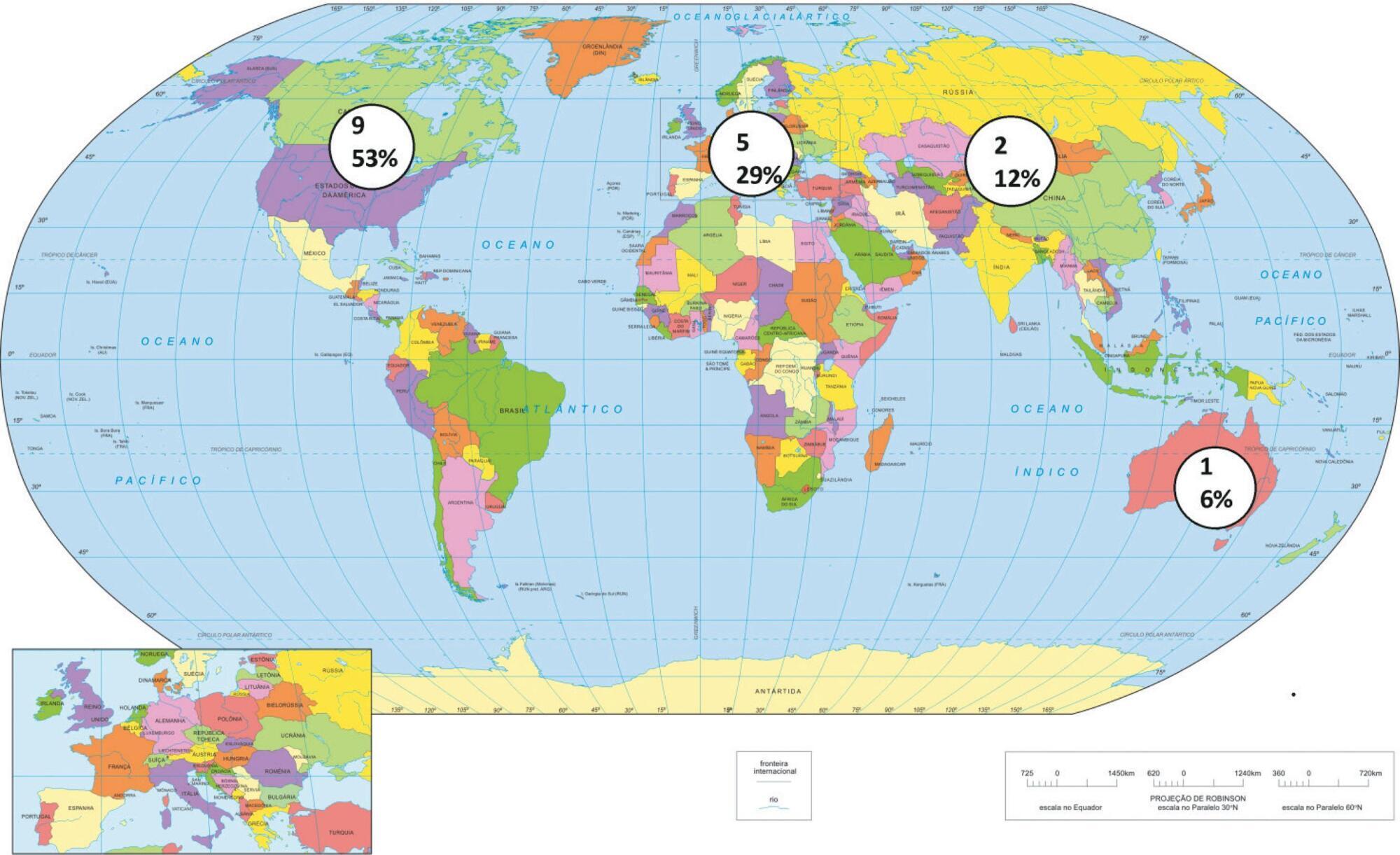
-
ORIGINAL ARTICLE10-21-2019
“Waiting for a miracle”: Spirituality/Religiosity in coping with sickle cell disease
Revista Brasileira de Enfermagem. 2019;72(6):1554-1561
Abstract
ORIGINAL ARTICLE“Waiting for a miracle”: Spirituality/Religiosity in coping with sickle cell disease
Revista Brasileira de Enfermagem. 2019;72(6):1554-1561
DOI 10.1590/0034-7167-2018-0635
Views0See moreABSTRACT
Objective:
To understand spirituality/religiosity as experienced by people with sickle cell disease, and its influence on coping with the disease.
Method:
A qualitative, descriptive, and exploratory study conducted in the State of Bahia. Twenty-nine respondents participated in semi-structured interviews. Content analysis was used to analyze the empirical material.
Results:
Individuals with sickle cell disease experience spirituality/religiosity motivated by their hope for a miracle, and fear of death; among their rites are: reading religious materials, individual and group prayer, and attendance at worship services. The effects on their health include: comfort by means of coping by comparing two evils, anxiety relief, social support, and lifestyle changes; however, spirituality/religiosity may be impaired.
Final considerations:
This study demonstrates the need to qualify health professionals to address spiritual issues of these individuals during illness, with the aims of diagnosing suffering and anguish, and providing care, comfort and strengthening of the spiritual bonds of these individuals.
-
ORIGINAL ARTICLE12-21-2020
Construction and validation of a mobile application for development of nursing history and diagnosis
Revista Brasileira de Enfermagem. 2020;73:e20190674
Abstract
ORIGINAL ARTICLEConstruction and validation of a mobile application for development of nursing history and diagnosis
Revista Brasileira de Enfermagem. 2020;73:e20190674
DOI 10.1590/0034-7167-2019-0674
Views0See moreABSTRACT
Objectives:
to describe the construction and validation process for a mobile application for development of the nursing history and diagnosis.
Methods:
methodological study conducted in 2018 in three stages: content creation, based on the Basic Human Needs categories and nursing diagnoses; content assessment by nine nursing judges, with calculation of the content validity index; and construction of the application, which included definition of the requirements, a conceptual map, implementation and prototyping options, tests and implementation.
Results:
the application was organized by sections: Grouped Basic Human Needs, Cranial pair tests, Clinical assessment scales and Additional tests. Two section were adjusted according to the judges’ suggestions.
Final Considerations:
it is the first application produced in Brazil based on the Basic Human Need categories, which enables quick access to information, concepts and typical nomenclatures of semiology, recording of clinical data and definition of nursing diagnoses.
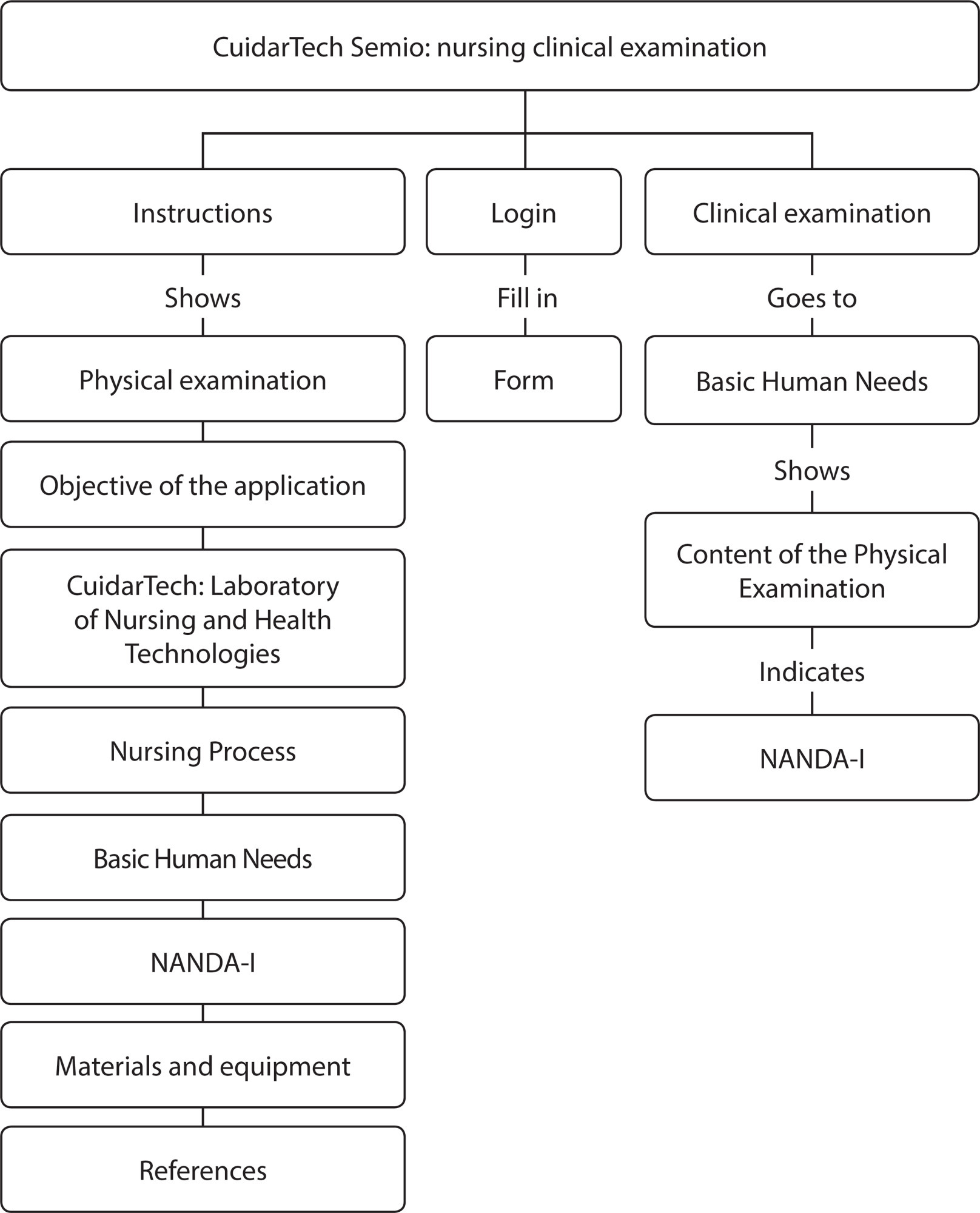
-
ORIGINAL ARTICLE10-01-2022
Factors associated with vulnerability and fragility in the elderly: a cross-sectional study
Revista Brasileira de Enfermagem. 2022;75(2):e20200399
Abstract
ORIGINAL ARTICLEFactors associated with vulnerability and fragility in the elderly: a cross-sectional study
Revista Brasileira de Enfermagem. 2022;75(2):e20200399
DOI 10.1590/0034-7167-2020-0399
Views0See moreABSTRACT
Objectives:
to assess factors associated with vulnerability and fragility in the elderly.
Methods:
crosssectional study with 384 elderly people in Fortaleza, Ceará. The Vulnerable Elders Survey and Clinical-Functional Vulnerability Index – 20 were used. Chi-square and Fisher’s exact tests were used for associations. In the analysis of the combined influence of risk factors, the stepwise logistic regression and multinomial regression methods were adopted.
Results:
251 (65.4%) non-vulnerable and 133 (34.6%) vulnerable elders. From the vulnerable elders analyzed, 42 (30.9%) are at high risk for frailty. Factors associated with vulnerability: age, gender, presence of comorbidities, hypertension, diabetes, osteoporosis and use of polypharmacy. There is a 30% increase in the chance of vulnerability for each additional drug. Physical activity reduces the chance of vulnerability by 60%. Factors associated with frailty: educational level; self-perception of health; comorbidities; polypharmacy.
Conclusions:
it is important to pay attention to the presence of arterial hypertension, osteoporosis, polypharmacy, and encourage the practice of physical activity.
-
ORIGINAL ARTICLE10-21-2019
Caring ability, burden, stress and coping of family caregivers of people in cancer treatment
Revista Brasileira de Enfermagem. 2019;72(6):1541-1546
Abstract
ORIGINAL ARTICLECaring ability, burden, stress and coping of family caregivers of people in cancer treatment
Revista Brasileira de Enfermagem. 2019;72(6):1541-1546
DOI 10.1590/0034-7167-2018-0605
Views0See moreABSTRACT
Objective:
To analyze the association between the caring ability and the burden, stress and coping of family caregivers of people in cancer treatment.
Method:
A cross-sectional study with 132 family caregivers. The following instruments were applied: a characterization instrument, the Caring Ability Inventory, the Zarit Burden Interview, the Perceived Stress Scale, and the Brief COPE. The Spearman Correlation was used with significance ≤5%.
Results:
There were significant and positive correlations between total caring ability and: burden – interpersonal relationship (p=0.03); stress (p=0.02) and maladaptive coping (p=0.00); and inversely proportional correlations with problem-focused coping (p=0.03). The courage had inversely proportional correlation with: self-efficacy (p=0.03), interpersonal relationship (p=0.00), stress (p=0.04) and maladaptive coping (p=0.00). The knowledge had significant and positive correlation with problem-focused coping (p=0.00), adaptive coping (p=0.01), and inverse correlation with stress (p=0.02).
Conclusion:
The level of caring ability correlates with levels of stress and burden, and with the type of coping strategy used by family caregivers.
-
ORIGINAL ARTICLE10-18-2022
Clinical simulation as a Nursing Fundamentals teaching method: a quasi-experimental study
Revista Brasileira de Enfermagem. 2022;75(2):e20201155
Abstract
ORIGINAL ARTICLEClinical simulation as a Nursing Fundamentals teaching method: a quasi-experimental study
Revista Brasileira de Enfermagem. 2022;75(2):e20201155
DOI 10.1590/0034-7167-2020-1155
Views0See moreABSTRACT
Objectives:
to evaluate students’ knowledge gain after the implementation of clinical simulation in Nursing Fundamentals disciplines.
Methods:
a quasi-experimental intervention was carried out with 60 students, distributed in comparison and intervention groups, who underwent traditional teaching and traditional teaching associated with simulated teaching, respectively. Pre-test and post-test instruments were applied to both groups.
Results:
after analyzing the students’ performance through the applied instruments, both groups had a cognitive evolution along with the taught content, however, when compared, the intervention group obtained a higher knowledge gain than the comparison group (p = 0.016), demonstrating progressive and increasing improvement with the use of the methodology.
Conclusions:
simulated teaching significantly helps students in gaining technical-cognitive knowledge. Therefore, it is recommended to adhere to the use of this methodology for teaching Nursing Fundamentals.
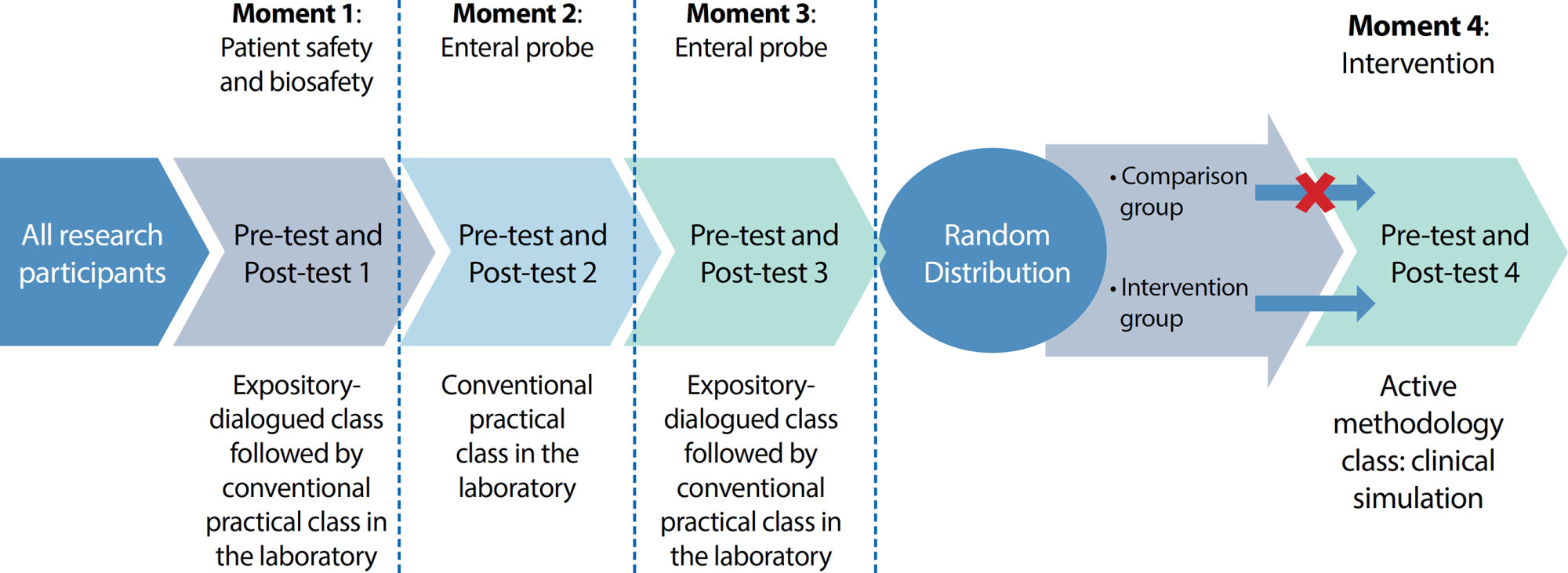
-
ORIGINAL ARTICLE08-10-2020
Eliot Freidson’s sociology of professions: an interpretation for Health and Nursing
Revista Brasileira de Enfermagem. 2020;73(6):e20180950
Abstract
ORIGINAL ARTICLEEliot Freidson’s sociology of professions: an interpretation for Health and Nursing
Revista Brasileira de Enfermagem. 2020;73(6):e20180950
DOI 10.1590/0034-7167-2018-0950
Views0See moreABSTRACT
Objectives:
to analyze theoretical conceptions of Eliot Freidson’s Sociology of Professions scoped on health and nursing professions.
Methods:
Eight nurses were interviewed, all involved in the development of the professional Council on the timeframe from 1975 to 1986. Documental resources were Laws, Ordinances, Resolutions, Reports, Meeting Minutes and Public Deeds. Information was organized as from literature and Eliot Freidson’s conceptions, and thematic content analysis was carried out.
Results:
the concepts authored by Eliot Freidson allowed for the development of a concept chart that portrays the nursing profession and that may be expanded for the other occupations in the health field, in consonance with professional organization in the country.
Final Considerations:
Eliot Freidson’s framework, in interpretation for nursing, consolidates the profession with relative autonomy, expertise by Nursing Care Systematization and credentialism by professional normalizations.
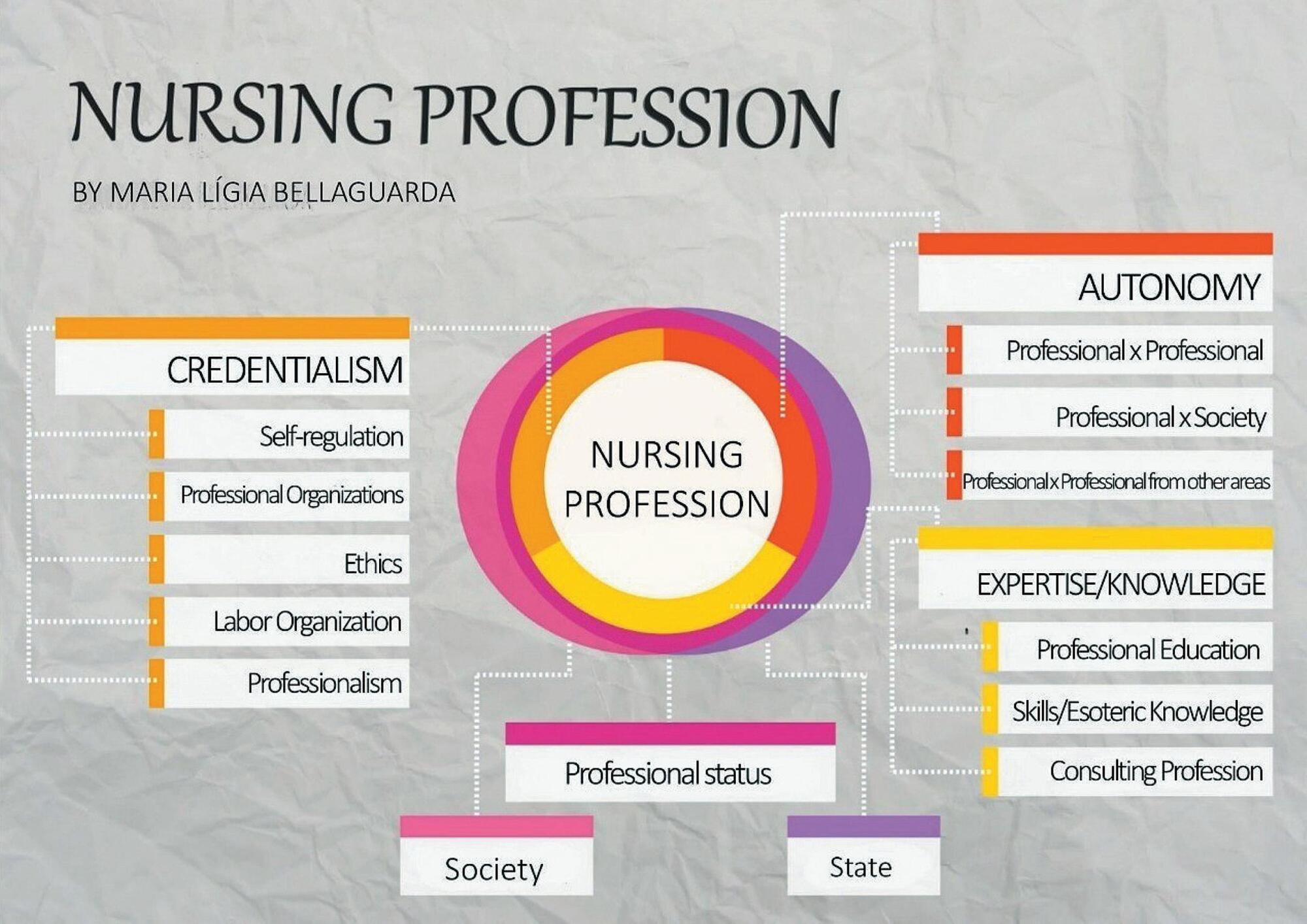
Search
Search in:
Nuvem de Tags
Adolescente (85) Atenção Primária à Saúde (239) COVID-19 (91) Criança (91) Cuidados de Enfermagem (269) Educação em Enfermagem (151) Educação em Saúde (139) Enfermagem (930) Enfermagem Pediátrica (86) Estudantes de Enfermagem (77) Estudos de Validação (131) Família (87) Idoso (208) Promoção da Saúde (99) Qualidade de Vida (104) Saúde do Trabalhador (86) Saúde Mental (145) Saúde Pública (82) Segurança do Paciente (150) Tecnologia Educacional (100)



